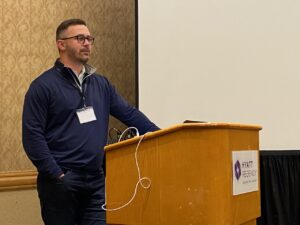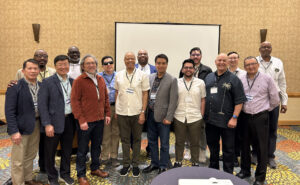
WASHINGTON (BP)–The deteriorating moral state of America can be blamed on a rising culture of polyamory, a culture that endorses serial relationships rather than lifelong, monogamous relationships, said Patrick Fagan in a lecture at the Family Research Council.
“The culture of the traditional family — it is now in intense competition, even at war,” said Fagan, senior fellow and director of FRC’s Marriage and Religion Research Institute.
In the lecture, Fagan presented examples of how the culture of polyamory has manifested itself in American society. Polyamory been able to “survive and thrive” by overtaking four principal areas of American life: welfare programs, childhood education, sex education and health programs. Once the polyamorous culture penetrated these areas, it gained the advantage over a monogamous culture, Fagan said.
The difference in the cultures is rooted in sexual ideal, he told the audience. The culture of monogamy is defined by committed, lifelong relationships. A polyamorous culture, though, fosters “serious, serial” relationships with little concern for commitment of any kind. “It has history-changing impacts on the family, local, national and global levels,” Fagan said.
Fagan argued that Western civilization, including the birth of the U.S. Constitution, was developed by a monogamous culture. He outlined the differences between the two cultures and the effects each bears on society.
One of the principal differences is the age group that each culture spotlights. A monogamous culture focuses on children, making it “future oriented.” A culture of polyamory, however, is primarily concerned with adults and present circumstance. While those practicing a monogamous culture spend their time preparing for future generations, the polyamorous culture is concerned with “here and now,” he said.
Another key point, Fagan said: A culture of monogamy produces strong males, while a polyamorous culture forces the women to be the “anchor” gender.
Since the polyamorous culture is rooted in non-committed relationships, it harbors little to no sexual responsibility, Fagan said. This has produced what he calls “weak males” — a generation of men with no sense of obligation or reliability.
“Despite the denials of radical feminists, the culture of polyamory aggressively fosters the male they most decry — the sexually and physically harassing and abusing and abandoning male,” Fagan said during the Oct. 27 lecture.
Statistics show about 34 percent of all American children “live absent their biological father,” according to the National Responsible Fatherhood Clearinghouse. Further research from the organization shows “children living with their married, biological (or adoptive) parents are less likely to be poor, to use drugs, to experience educational, health, emotional and behavioral problems, to be victims of child abuse, and to engage in criminal behavior than their peers with absent fathers.”
Those in need of welfare, Fagan said, are those who have not been “sexually responsible,” which often leads to male abandonment and the necessity of social welfare programs. These single-parent families are a perfect target for the polyamorous culture, since they lack a traditional family structure.
In an age in which men have an average of seven sexual partners in their lifetime, monogamy is rapidly becoming the minority culture in America, Fagan said. While he said the secular culture bears the brunt of the blame, he also recognized the role of the church in the rising culture of polyamory.
In recent years the church has undergone a shift from traditional values and no longer preaches the necessity of chastity, and there must be reform in the church before any progress can be made in society as a whole, Fagan said.
Men who believe in monogamy, Fagan said, must take a stand, Fagan said. Otherwise, the polyamorous culture will continue to “capture” children and exponentially spread polyamory, he said.
“We, the protectors of family and children, need to organize as we’ve never organized before,” Fagan said. “What’s at stake is much bigger than just big government. What’s at stake is the fundamental institution of the family.”
— 30 —
Hannah Cummings is an intern with the Washington bureau of Baptist Press.
















